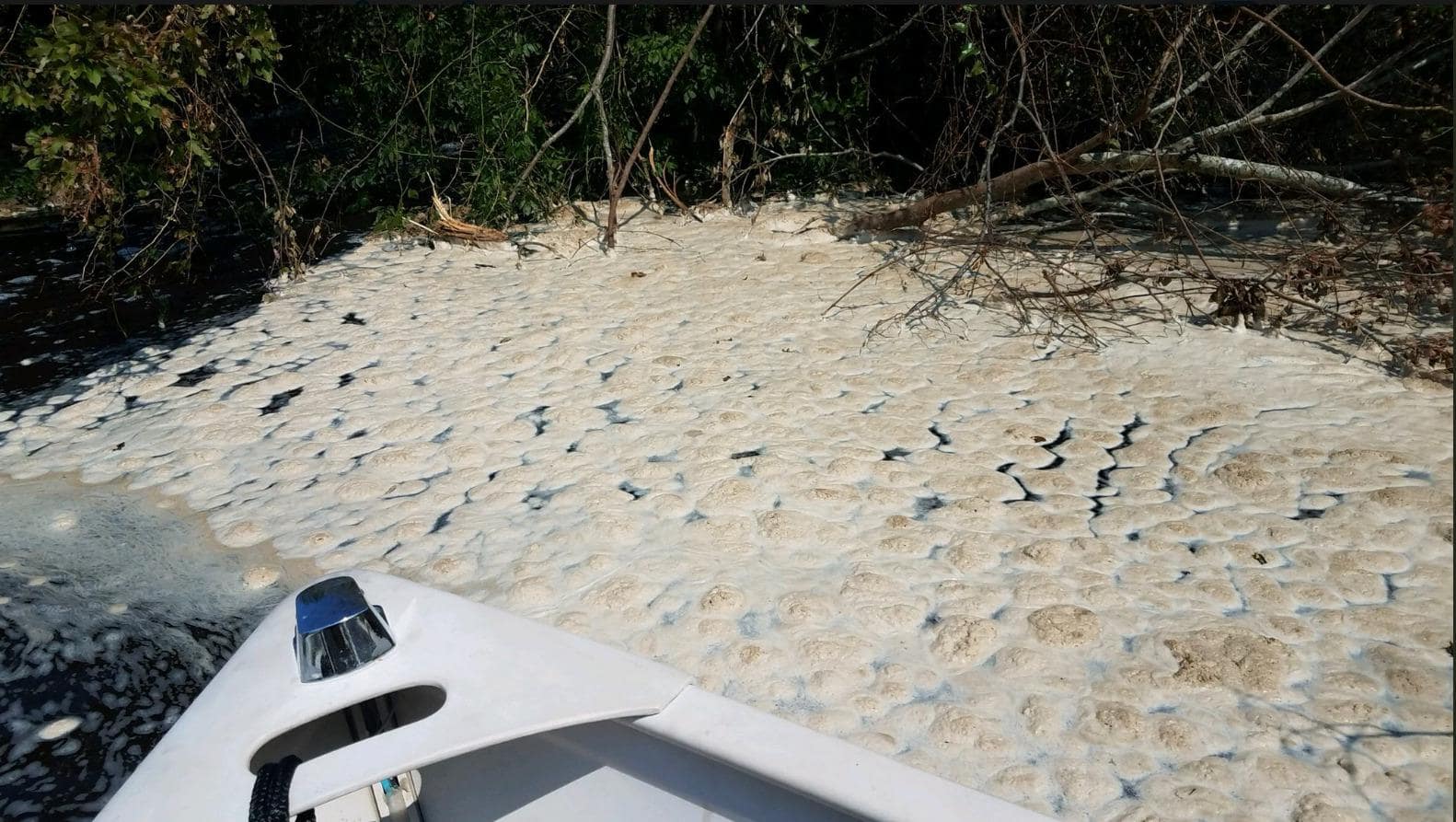After Florence, A Coal Ash Controversy In A North Carolina River
4:23 minutes

 This segment is part of The State of Science, a series featuring science stories from public radio stations across the United States. A version of this story, by Jason deBruyn, originally appeared on 91.5 WUNC Public Radio in North Carolina.
This segment is part of The State of Science, a series featuring science stories from public radio stations across the United States. A version of this story, by Jason deBruyn, originally appeared on 91.5 WUNC Public Radio in North Carolina.
There’s ongoing disagreement about the levels of coal ash in the Cape Fear River near Wilmington, North Carolina. Environmental advocates say they have visibly seen ash, but Duke Energy says its water tests show otherwise.
David Burton and Matt Butler are part of the Waterkeeper Alliance, the environmental group that works to protects waterways. Burton and Butler are part of the rapid response team for Hurricane Florence. They were out on the Cape Fear River soon after the storm last week and saw foam in the river from running water. But they saw something else, too.
“This is quite obviously pretty different stuff,” said Burton, while dropping the oar in a gray, ashy-looking clump floating in the water. “The sediment’s really different. It looks like sand but sand sinks. And you can see the spherical nature of the particles there. It’s indicative of coal ash.”
Burton and other riverkeepers say they can identify coal ash by feel.
“You know if you have gloves on, you can roll it around in your fingers and feel those little pebbles,” Burton said. “It’s almost like little tiny marbles in your hand.”
Historic flooding after Hurricane Florence caused several dam breaches late last week. Those dams are supposed to keep waste water from the Duke Energy power plant separate from natural waters of the Cape Fear, Butler said.
“Now what we’ve got is the Cape Fear River, Sutton Lake, and coal ash ponds are all essentially the same body of water,” Butler said.
Some areas that are normally dry land are now under 10 feet of water.
[What’s it like to dig up dinosaurs? Take a trip out to Utah with us to find out.]
Duke Energy says it has tested the waters in the Cape Fear. On Sunday, spokeswoman Paige Sheehan said the tests have been clean.
“The good news is, is all the results, both upstream and downstream are fairly consistent, and they’re all within water quality standards that are in place to protect the environment,” Sheehan said.
What is visible in the water, Sheehan said, are cenospheres, another coal ash byproduct that Duke says is not harmful. But Burton, the waterkeeper, says that’s just another word for the same thing.
“So if they know that you know that coal ash is a bad thing, then they will call it something else,” Burton said. “And it doesn’t matter what you call it. It’s got heavy metals bonded to it. It’s got toxins bonded to it. It’s a constituent of coal ash.”
State regulators didn’t get on the Cape Fear until Saturday. Michael Regan, secretary of the North Carolina Department of Environmental Quality, addressed why the state hadn’t conducted water tests yet.
“I think one way to deal with this is to rely more on renewable energy. I think our investment in solar and wind should be strengthened.”
“Our goal is to not put any of our state employees in harm’s way, and or inhibit any of the operations that our sister agencies are conducting,” Regan said at a news conference Friday.
But Butler worries the state’s samples will be diluted because they weren’t collected until Saturday.
“In our opinion, citing that safety was a concern and why they didn’t get out is more them having the ability to—if they’re not looking for the problems, they won’t find them,” Butler said.
Governor Roy Cooper visited the area over the weekend. He said his administration would hold accountable whoever is responsible. Looking ahead, he also advocated for cleaner sources of energy.
“I think one way to deal with this is to rely more on renewable energy,” Cooper said. “I think our investment in solar and wind should be strengthened, particularly as we see this happen.”
But the immediate concern is the water quality in the Cape Fear River. State regulators expect their tests back by mid-week.
Jason deBruyn is a data reporter at WUNC, based in Durham, North Carolina.
As Science Friday’s director and senior producer, Charles Bergquist channels the chaos of a live production studio into something sounding like a radio program. Favorite topics include planetary sciences, chemistry, materials, and shiny things with blinking lights.